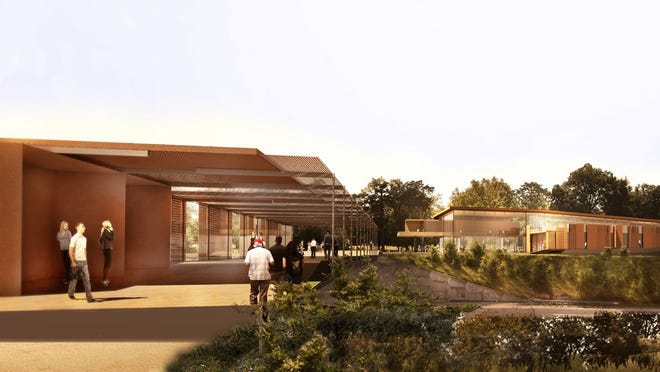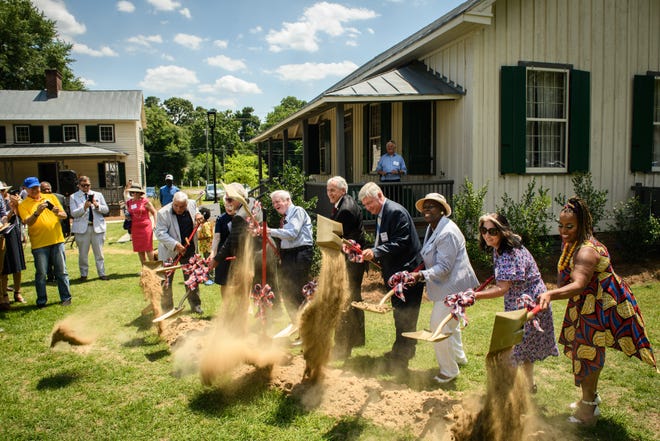The N.C. Civil War & Reconstruction History Center, an $80 million project, appears to be on the glide path to construction in Fayetteville thanks to a cash influx approved in the recent state budget.
“Absolutely yes, it will be built,” said David Winslow, a spokesman and consultant for the center, on Monday. “No ‘ifs’ ‘ands’ or ‘buts on that.’”
Organizers hope to break ground in July 2023 and plan a grand opening for April 2025.
The center received $59.6 million in the budget passed earlier this month by the N.C. General Assembly and signed into law by Gov. Roy Cooper. Although the center’s proposed content has raised some skepticism, it has been supported by both Republicans and Democrats in the state legislature, including the Cumberland County delegation.
“It was extraordinary to get that kind of bipartisan support,” Winslow said.
He added that the bipartisanship comes at a difficult time in the country’s history.
“People have been very polarized,” he said. “We are very much an institution in the middle. We want to be a place where people from all walks of life can come and learn, and be respectful and be respected. That’s what we’re trying to do here.”
The History Center is a state museum being built in stages on the site of the United States Arsenal, an historic Civil War site. The main building will be designed for 60,000 square feet and will be located off Hay Street near the overpass for the Martin Luther King Jr. Freeway and will replace the Museum of the Cape Fear, also a state museum. The center will contribute 200 new jobs and add $18 million to the economy each year, according to a center news release.
Its funding comes from a mix of public and private sources. More than $14.5 million has been raised in private contributions, and the City of Fayetteville and Cumberland County have agreed to provide $7.5 million each, the release states.
In June, officials held a groundbreaking for the VanStory History Village at the center site. The center has also launched a digital component that is planned to eventually shape the teaching of the Civil War and Reconstruction in K-12 classrooms. In the mean time, the History Center has hosted numerous events that have featured top scholars in the time period covered.

The N.C. Civil War & Reconstruction History Center in Fayetteville received $59 million in the budget passed recently by the N.C. General Assembly. Center officials are planning a grand opening for spring 2025. Contributed/Eisterhold Associates
Center officials have said for several years their goal is to tell the story of these events from the viewpoint of all North Carolinians — the soldiers, African Americans, enslaved and free, women, Native Americans and others. The center is collecting narratives and stories from descendants of those living during the war period. Officials say their focus is education and have pushed back against any suggestion the center seeks to rehash a pro-Confederate spin on the war.
“This is one of the biggest appropriations in the history of Cumberland County and it represents the opportunity of a lifetime for us, for all of us,” said Mac Healy, chairman of the Center’s board of directors, in the news release. “This is an investment in education, which does more to strengthen a community than any other investment you could make.”
Still, the History Center’s inclusion of Civil War history has led to questions from at least some local figures, particularly in the Black community.
At last week’s City Council meeting, Councilwoman Shakeyla Ingram raised the issue of state funding for the History Center as the council considered a request to grant more funding for the Martin Luther King Jr. Memorial Park, located off Murchison Road. She compared the large sum of money the state gave the History Center vs. the park, which has received far less over time.
At the meeting, state Rep. John Szoka spoke to the council about the economic impact of the History Center. He said the name itself has “generated some interest” and that the N.C. Dept. of Cultural Resources, of which the museum would be a part, will “take input from people across the state, including City Council as to what the actual name should be.
“So that is not set in stone.”
In 2019, some council members, including Mayor Mitch Colvin, raised concerns from constituents about whether the History Center would truly cover the African-American experience.
Healy and Mary Lynn Bryan, another member of the Center’s Board, attempted to address those concerns in a Fayetteville Observer Opinion piece in November of that year.
They wrote: “We’ve already begun to cover the African-American experience in North Carolina, including the enslaved persons who arrived in Fayetteville with Union Gen. William T. Sherman and continued on to Wilmington, where they founded a thriving middle class that ended in a coup. We’ve told the story of the those freed from slavery who joined the Union Army in Goldsboro, and we’ve tracked down some of their descendants who live in the Cape Fear Region. We’ve told of the Underground Railroad station on the Guilford College campus in Greensboro.
“We’re not stopping there — we’ll continue to tell those stories as we continue developing content for the Center — and to make certain of it, we have nationally recognized African-American historians who have agreed to work alongside us.”
Few city or county leaders were present at the June groundbreaking of the History Village, although there had been more visible presence at past events. Councilwoman Kathy Jensen from the City Council and Michael Boose with the Cumberland County Board of Commissioners spoke.
Winslow said he did not take the absence of some local leaders at that event as an indicator that the city and county leaders’ support was drying up. He said the county was setting aside money to pay its $7.5 million share. The city’s pledge he said was down to $6.4 million, after it provided $100,000 early on and deducted from its pledge the value of the land it transferred at Arsenal Park, which it estimated at $1 million.
“These are people of good will; they will do the right thing,” he said.
–fayobserver.com



